As a self-proclaimed breakfast person who has savored the diverse flavors of Türkiye on my last two trips, I’m excited to share with you a guide explaining exactly what is a Turkish breakfast and what you can taste to really absorb the Turkish culture before you head off on a day of sightseeing.
Do you reserve a good breakfast just for a Sunday morning? Well, not in Turkiye. My guide covers all the best dishes and drinks that make up a typical breakfast in Turkey. And are sure to guarantee you a delightful experience that is a total social affair.
For those who share my enthusiasm for morning meals and relish the adventure of trying new culinary delights, prepare to be enthralled by a full Turkish breakfast experience.
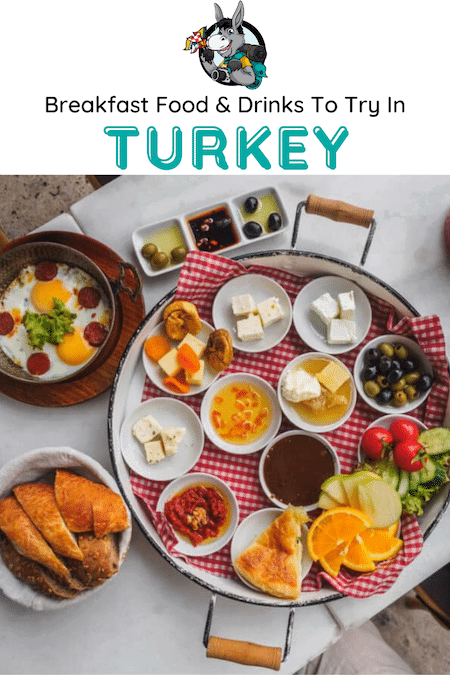
In Türkiye, breakfast isn’t just the most important meal of the day; it’s a celebration of tastes and a testament to the art of starting the day right. Here is a list of Turkish breakfast food ideas for you to try.
Egg Dishes 🥚
A typical breakfast has at least one eggy dish.
- 🥚 Kızarmış yumurta (fried boiled eggs)
- 🥚 Sucuklu Yumurta (eggs with spicy dried sausage)
- 🥚 Pastirmali Yumurta (eggs with air-dried cured beef, mutton, or buffalo)
- 🥚 Ispanakli Yumurta (eggs with spinach)
- 🥚 Kıymalı Yumurta (fried eggs with ground meat)
- 🥚 Menemen (scrambled eggs with vegetables and spices)
- 🥚 Çılbır (poached eggs with yogurt)
- 🥚 Omlet (omelette with various ingredients)
Turkish Bread, Pastries And Bakery Items 🍞
- 🍞 Simit (a bagel-like bread)
- 🍞 Açma (a soft, bun-like pastry)
- 🍞 Börek (a flaky dough pastry with various fillings)
- 🍞 Sigara Börek (crunchy rolls with cheese filling)
- 🍞 Açması Börek (layered pastry similar to lasagna)
- 🍞 Pide (boat-shaped type of flatbread with various fillings)
- 🍞 Bazlama (a flat, round piece of bread cooked in a pan)
- 🍞 Gözleme (flatbread with various fillings)
- 🍞 Poğaça (soft and fluffy pastry with different fillings)
- 🍞 Pişi (Turkish-style donuts)
Different Types Of Cheeses 🧀
- 🧀 Beyaz Peynir (brined cheese, similar to feta, known for its slightly grainy texture and tangy taste)
- 🧀 Kaşar Peyniri semi-hard, yellow cheese, similar to cheddar, often enjoyed sliced or grated)
- 🧀 Tulum Peyniri (ripened goat’s milk cheese, aged in a goat’s skin, known for its pungent flavor)
- 🧀 Çökelek (fresh cheeses made from leftover yogurt or buttermilk that is crumbly)
- 🧀 Hellim Peyniri -Halloumi (semi-hard, unripened brined cheese that’s great for grilling or frying)
- 🧀 Lor Peyniri (fresh cheese with a soft, crumbly texture, similar to ricotta, often used in baking)
- 🧀 Ezine Peyniri (a variety type of cheese made from cow, sheep, or goat milk, known for its distinct flavor)
- 🧀 Mihaliç Peyniri (hard, aged cheese with a sharp and salty taste, often grated over dishes)
Other Traditional Foods 🍴
- 🍴 Kuymak (or Muhlama) (a mixture of cheese, butter, water, and cornmeal)
- 🍴 Izgara Hellim Peyniri (grilled halloumi cheese)
- 🍴 Bal Kaymak (honey and Turkish savory whipped cream)
- 🍴 Zeytin Ezmesi (olive paste)
- 🍴 Pekmez (condensed juice from fruits or berries)
- 🍴 Tahin Ezmesi (sesame paste)
- 🍴 Findik Ezmesi (hazelnut paste)
- 🍴 Acuka or Muhammara (a type of tomato paste with spices and lemon)
In this blog post, we’ll introduce you to some must-try Turkish breakfast food and drinks that will tantalize your taste buds and leave you wanting more. From rich, creamy Sütlü Kahve (Turkish coffee with milk) to savory Menemen (scrambled eggs with fresh tomatoes), brace yourself for a mouth-watering culinary journey through Türkiye’s vibrant breakfast culture.
So please grab a cup of tea and join us on this delicious traditional breakfast in Turkey adventure!
Skip Ahead To My Advice Here!
Introduction To Turkish Breakfasts
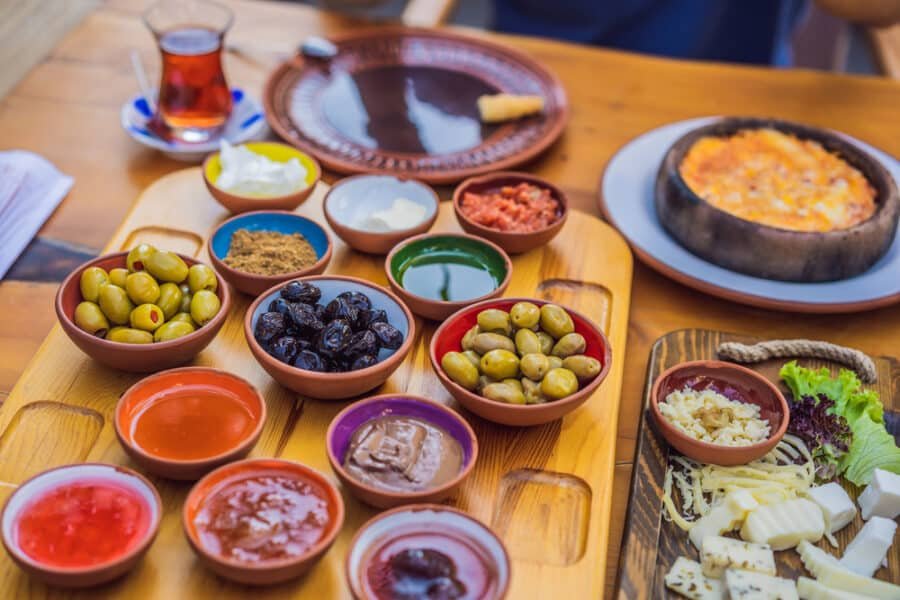
Turkish breakfast, called kahvaltı, is a leisurely affair usually enjoyed on weekends by Turkish people – but you can eat it daily while on vacation in Türkiye. Breakfast in Turkey often consists of a spread of meze (appetizers), cheeses, eggs, green and black olives, bread, and pastries.
Oh, and of course, no typical Turkish breakfast is complete without a cup of strong coffee or tea.
Here are some of my favorite ‘kahvaltı’ Turkish breakfast food items to tantalize your tastebuds:
- Sütlü Kahve: this creamy Turkish coffee is made with equal parts ground coffee, water, and lots of sugar and milk. It’s traditionally served in small cups with no handles
- Simit: these sesame-covered bread rings are common on street corners in Türkiye. They’re often eaten for breakfast with cheese or jam
- Menemen: this dish of scrambled eggs, tomatoes, bell peppers, and onions is commonly served for breakfast in Turkey. It’s often made with çaylak cheese, which is similar to feta
- Beyaz Peynir: this white cheese made from sheep’s milk is a staple of the Turkish breakfast table. It’s often eaten with honey or jam
- Kaymak: this rich clotted cream is made from buffalo milk and is commonly served on white bread or pancakes for breakfast in Türkiye
The History Of Kahvalti & Its Social Importance Today
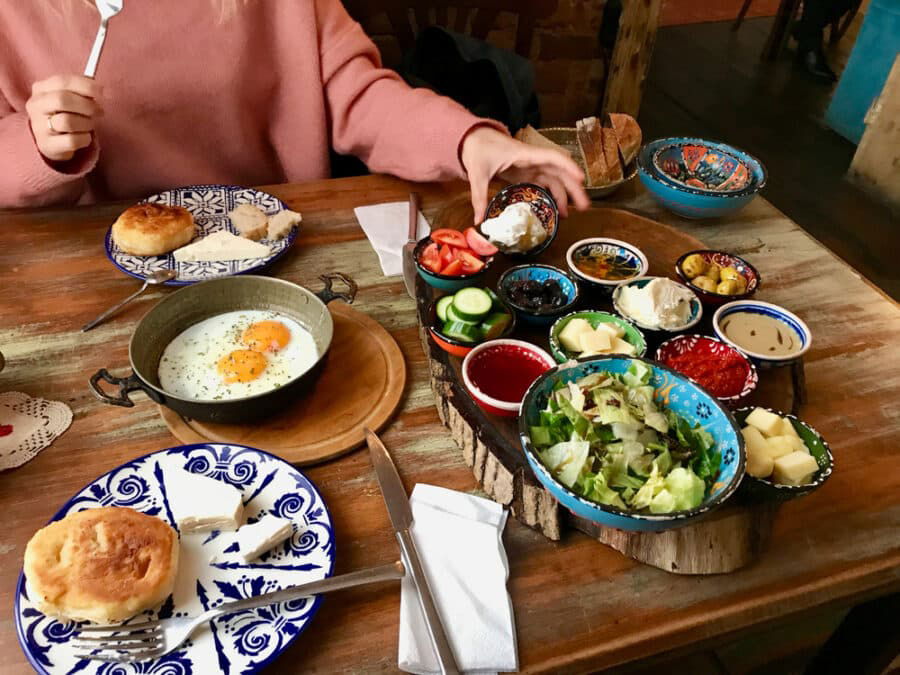
Historical Kahvalti
Kahvalti isn’t just breakfast. Oh nooo! It’s so much more than that. It’s an experience, a social event, a chance to bond, while filling up for the day ahead. It doesn’t even have to be morning to enjoy this huge spread; you can eat it at any time of the day.
The history of kahvalti dates back centuries, with its origins rooted in the Ottoman Empire. During this time, breakfast was considered a vital meal that provided sustenance for a long day ahead. The Ottomans believed in starting the day with a nutritious and wholesome meal, which led to the development of a diverse and elaborate breakfast spread that we now know as kahvalti.
The word “kahvalti” itself is derived from two words: “kahve,” meaning coffee, and “alti,” meaning under. Hence, kahvalti refers to the meal that is had before drinking coffee. In the earlier days of the Ottoman Empire, kahvalti was enjoyed by the elite members of society and was often a lavish affair, featuring an array of dishes such as cheeses, olives, honey, jams, bread, and various pastries.
As time passed, kahvalti became more ingrained in Turkish culture and spread to all levels of society. It evolved into a social ritual that fostered connections between family and friends. Today, kahvalti is a beloved tradition that is enjoyed by people of all ages and backgrounds in Turkey. In fact, when I first met my husband, he was horrified that I didn’t eat a full breakfast every day and simply grabbed some cornflakes or a slice of toast!
Modern Kahvalti
The modern kahvalti experience is characterized by its emphasis on freshness, variety, and abundance. A typical kahvalti spread includes a selection of cheeses, olives, tomatoes, cucumbers, jams, honey, butter, bread, pastries, and eggs prepared in various ways. Turkish tea or coffee is the beverage of choice to accompany this feast.
The social element of kahvalti is what truly sets it apart from other meals. In Turkish culture, sharing a meal is a sacred act that brings people together. Kahvalti is no exception, as it is often enjoyed in the company of family and friends. It is a time to catch up, bond, and savour the flavours of the morning together.
Kahvalti also plays a significant role in Turkish hospitality. Guests are often welcomed with a hearty kahvalti spread, as a gesture of warmth and generosity. It is a way for hosts to show their appreciation for the company of their guests and to create an inviting atmosphere.
In addition to its social significance, kahvalti is also a reflection of Turkey’s diverse culinary heritage. The country’s unique geographical location, straddling Europe and Asia, has contributed to a fusion of flavours and ingredients in Turkish cuisine. The kahvalti spread showcases this diversity, with a mix of influences from Mediterranean, Middle Eastern, and Balkan cuisines.
As Turkey continues to modernize and evolve, the tradition of kahvalti remains a constant. It is a cultural touchstone that connects generations and preserves a sense of identity and belonging. Whether enjoyed in a bustling cafe in Istanbul or in the cozy confines of a family home in a rural village, kahvalti continues to be a cherished ritual that brings people together.
So, if you want to do something truly traditional during your time in Turkey, no matter where you’re visiting, make sure you go for a full Turkish breakfast at least once.
Brands We Use And Trust
The Do’s And Don’ts Of Turkish Breakfast
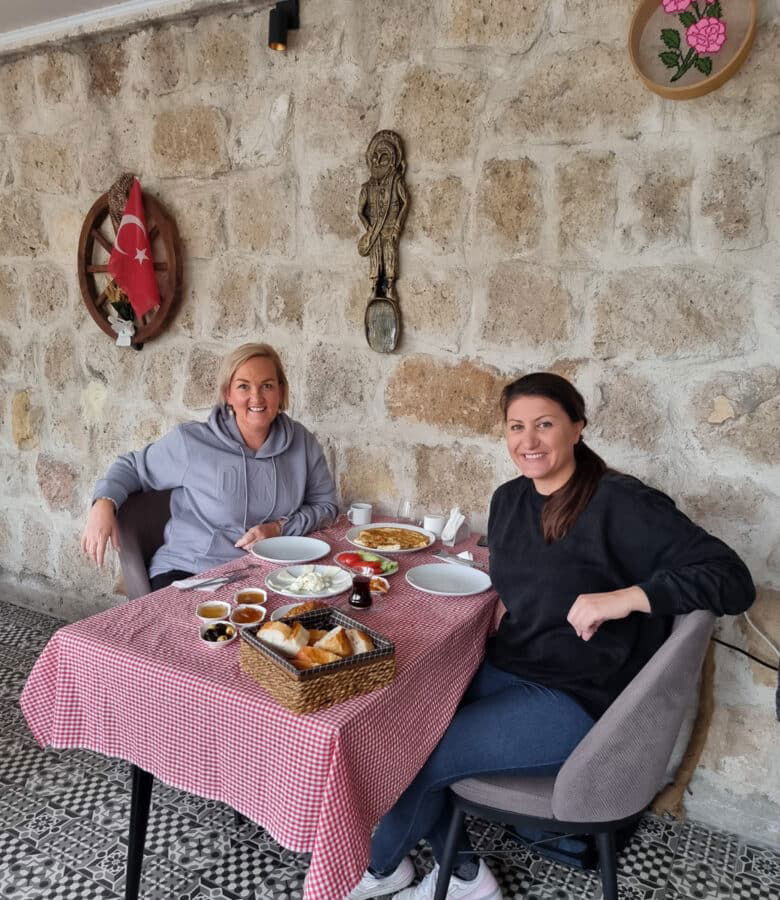
When you’re faced with a table full of plates and dishes, it’s important to get it right. After all, this is more than just a meal. So, let’s check out the do’s and don’ts of enjoying a fantastic Turkish breakfast.
Do’s
- Start with a variety of cheeses: Turkish breakfast always includes a selection of cheeses such as beyaz peynir (white cheese), kasar (yellow cheese), and tulum (aged cheese). These cheeses provide a rich and creamy base for your meal.
- Include olives: Olives are a staple of Turkish breakfast and are enjoyed in many different varieties. They add a salty and tangy flavour to the meal and are often paired with cheese and bread.
- Try different types of bread: Turkish breakfast typically features a variety of breads, such as simit (sesame-encrusted bread rings), borek (phyllo pastry filled with cheese or meat), and fresh crusty bread. Experiment with different types to find your favourite combination.
- Add some sweetness with honey and jam: Turkish breakfast often includes sweet components like honey, jam, and pekmez (grape molasses). These sweet spreads are delicious when paired with cheese or spread on fresh bread.
- Include eggs: Eggs are a versatile and popular component of Turkish breakfast. They can be cooked in various ways, such as scrambled, fried, or poached, and are often served with sucuk (spicy sausage) or tomatoes. Don’t be afraid to tell your server how you like your eggs; if you’re not into “runny eggs” you can tell them and they’ll cook them how you like them.
- Include veggies: Fresh vegetables like cucumbers, tomatoes, and peppers are a common feature of Turkish breakfast, providing a refreshing and healthy balance to the other rich and hearty dishes.
- Add lemon: There is one secret that will take your breakfast experience to another level. Cover all the fresh ingredients in lemon juice. Seriously, for me, it elevates the flavour beyond measure.
- Drink tea or Turkish coffee: Tea is the beverage of choice for Turkish breakfast and is typically served in traditional tulip-shaped glasses. Turkish coffee is also a popular option for those who prefer a stronger and richer drink. However, it’s probably best to drink coffee once you’ve finished eating.
Don’ts
- Don’t choose a small table: If you’ve ever seen a full breakfast spread before, you’ll know there are a million and one small plates, pots, and dishes. A small table means you’ll be juggling and worried about dropping something. Just get a large table. You’ll thank me for it later.
- Don’t rush: Turkish breakfast is a meal to be savoured, so take your time and enjoy each dish at a leisurely pace. Rushing through the meal would mean missing out on the experience. Many people feel like they can’t sit for too long because they’re taking up the table, but trust me: most locals will sit there for more than an hour, so you can do the same.
- Don’t overload your plate: Turkish breakfast is a feast with many dishes, so be mindful not to overload your plate with too much food. Take smaller portions and enjoy each dish before moving on to the next.
- Don’t shy away from trying new dishes: Turkish breakfast offers a wide variety of flavours and textures, so be adventurous and try new dishes that you may not have experienced before. I used to be really fussy with cheese, but since falling in love with the whole breakfast experience, I’ve discovered different types of cheese I wish I’d tried before.
- Don’t forget to socialize: Turkish breakfast is often enjoyed with friends and family, so take the time to socialize and connect with your dining companions while sharing this delicious meal. Eat, chat, and take your time!
Must-Try Foods For Breakfast In Turkey
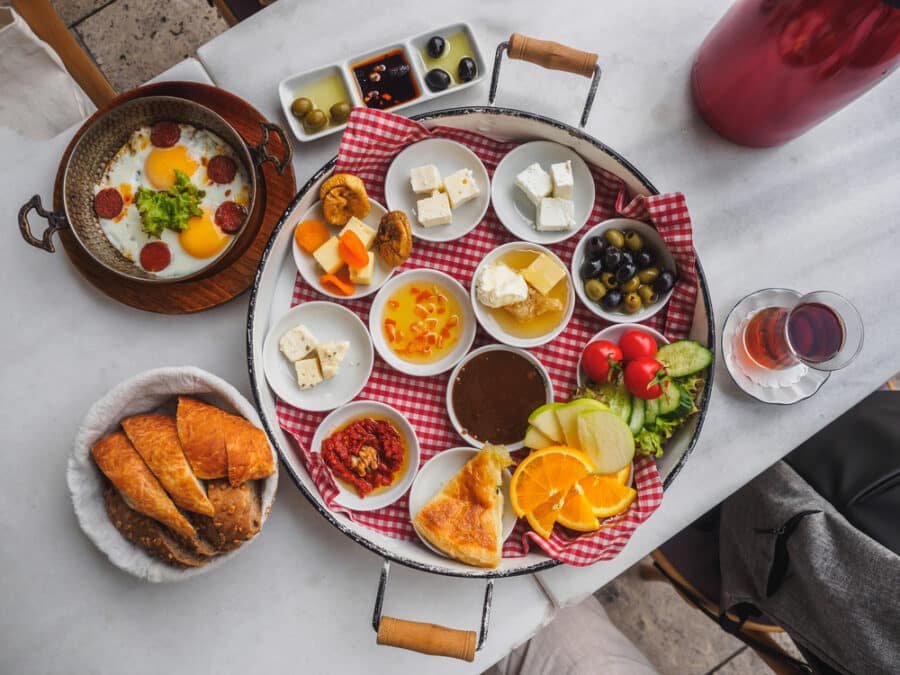
Breakfast in Turkey is a feast for the senses, with an array of colors, textures, and flavors to enjoy.
The most common dish is called menemen, a traditional egg and tomato scramble that is often spiced with peppers, and you’ll find it on all breakfast buffets in Turkey waiting for you. Start your day off right with one of these must-try Turkish breakfast foods…
1. Sütlü Kahve (Turkish Coffee)

The first thing you need to start your day with is Turkish coffee. Called sütlü kahve in Turkish, it is a traditional coffee drink made with finely ground coffee beans, water, and sugar. The coffee grounds are cooked in a pot with boiling water, and then the mixture is strained through a cloth filter. The coffee is served in small cups with the grounds still in them.
Turkish coffee is typically enjoyed with breakfast or after dinner. If you want to try something new for breakfast or add a little variety to your morning routine, try Turkish coffee! It’s a popular drink to enjoy while visiting Türkiye, and many tourists bring home boxes of Turkish coffee as souvenirs… well, I know at least we did.
2. Menemen (Scrambled Eggs with Tomatoes, Green Peppers, and Onion)
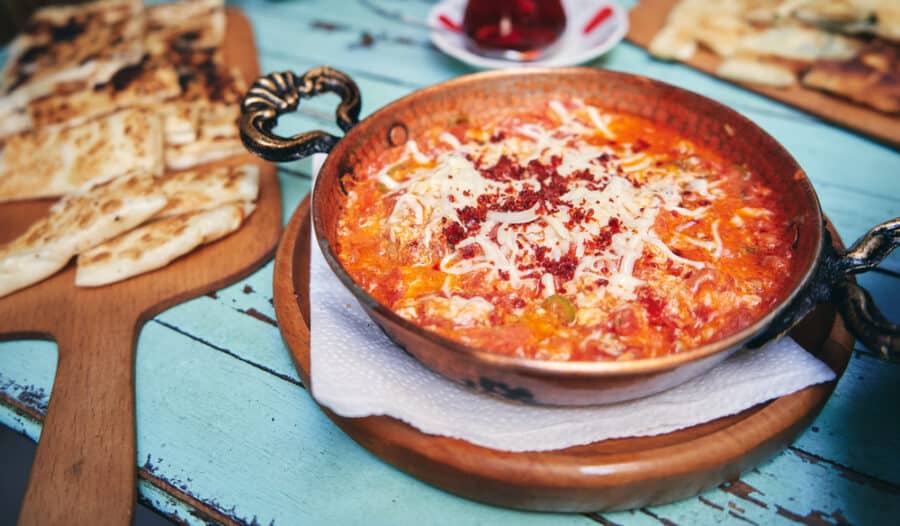
Move over boring hard-boiled eggs. Menemen is one of Turkey’s most popular breakfast dishes, and it’s easy to see why. It’s a delicious combination of scrambled eggs, tomatoes, green peppers, and onion, all cooked in a lightly spiced tomato sauce. It’s the perfect way to start your day or enjoy a light lunch or dinner.
If you’re visiting Türkiye, be sure to try menemen at least once. You can find it on menus nationwide, but it’s especially popular in Istanbul. And if you’re looking for the ultimate Turkish breakfast experience, order menemen with a side of pita bread and some strong Turkish coffee.
3. Gözleme (Traditional Flatbread Filled With Spinach, Cheese Or Meat)
Gözleme is a traditional Turkish breakfast dish made with thin crêpes filled with cheese or meat. The dish is believed to have originated in the Central Anatolian region of Turkey and is now popular throughout the country.
The dough for gözleme is made with flour, water, salt, and baking powder. It is then rolled out into thin sheets and cooked on a griddle. The fillings are typically made with feta cheese, spinach, or ground beef, and onion.
Gözleme is typically served with yogurt or kaymak (a type of clotted cream) and fresh herbs such as mint or parsley. It can also be enjoyed with a cup of Turkish coffee or tea.
4. Simit (Sesame Seed Bagel)
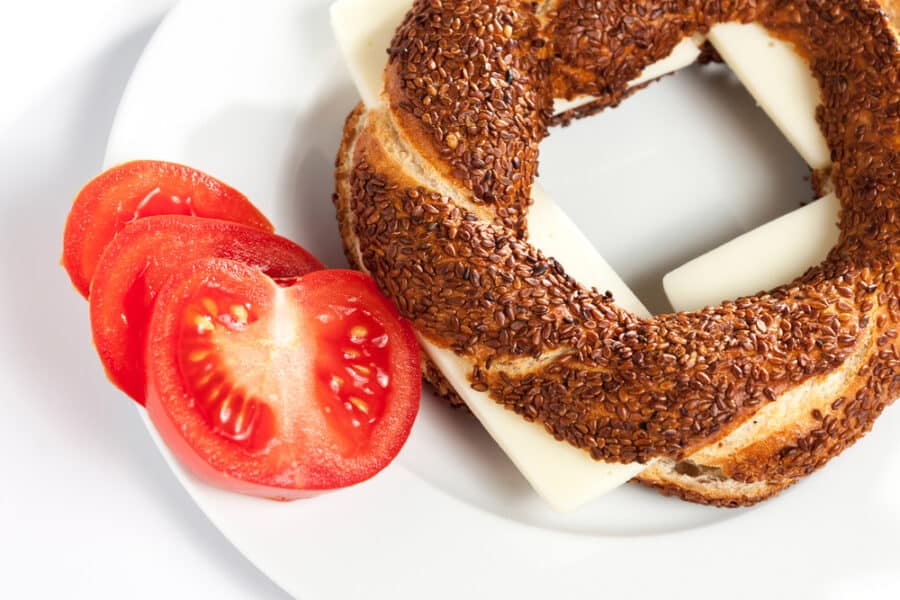
Simit is a type of Turkish bagel that is covered in sesame seeds. It is often eaten for breakfast with honey or pekmezi (see below). Simit can also be served filled with cheese or meat like a sandwich.
5. Kızarmış Yumurta (Fried Eggs)
A traditional Turkish breakfast wouldn’t be complete without kızarmış yumurta or fried eggs. These are usually served with a dollop of kaymak (clotted cream) and a sprinkling of pul biber (red pepper flakes). Another popular option is to add sucuk (Turkish sausage) or pastırma (cured beef) to the dish.
6. Sucuklu Yumurta (Sausage & Eggs)

One of the most popular items on the breakfast table is sucuklu yumurta, a dish made with eggs and spicy Turkish sausage.
The sausage, or sucuk, is first fried in olive oil until it is nicely crisped. Then, eggs are added to the pan and cooked until they reach your desired level of doneness. The yolks and whites should be well combined before adding salt, pepper, and other seasonings to taste. Sucuklu yumurta is often served with crusty bread for dipping!
7. Ispanakli Yumurta (Eggs With Spinach)
Ispanakli yumurta, or spinach and egg, is a typical Turkish breakfast dish. The eggs are cooked with spinach, onions, and garlic and are often served with freshly baked bread on the side. This dish is hearty and filling and makes a great start to the day.
8. Poğaça (Traditional Pastry)
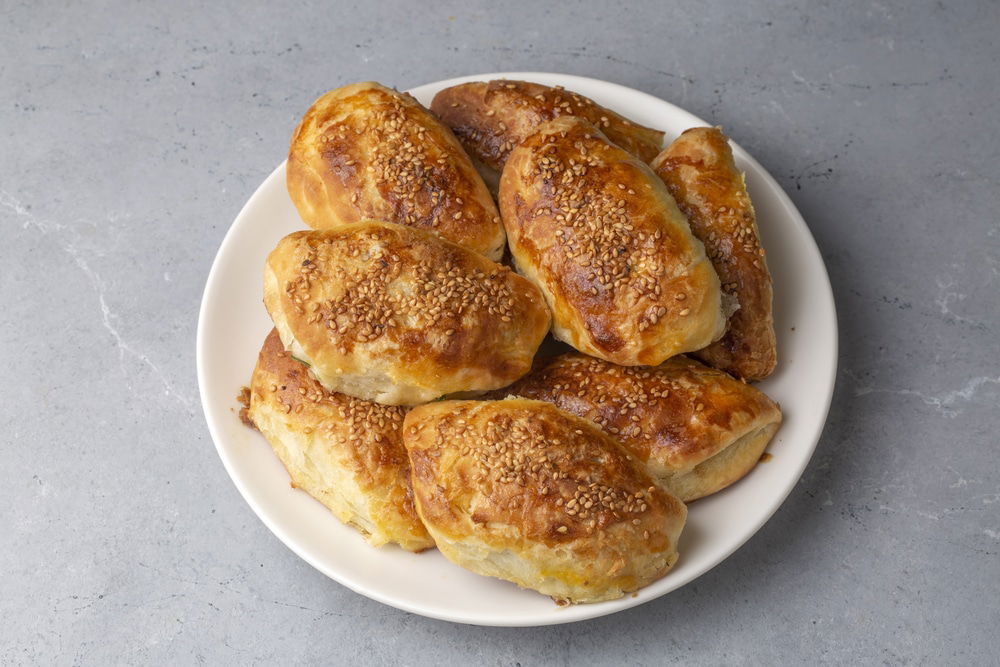
Poğaça is a savory fried pastry that is popular in Türkiye. It is typically made with a mixture of flour, water, salt, and yeast and then filled with either cheese or meat. Poğaça can be served as a main dish or as a side dish and is often eaten for breakfast and also for lunch
9. Borek
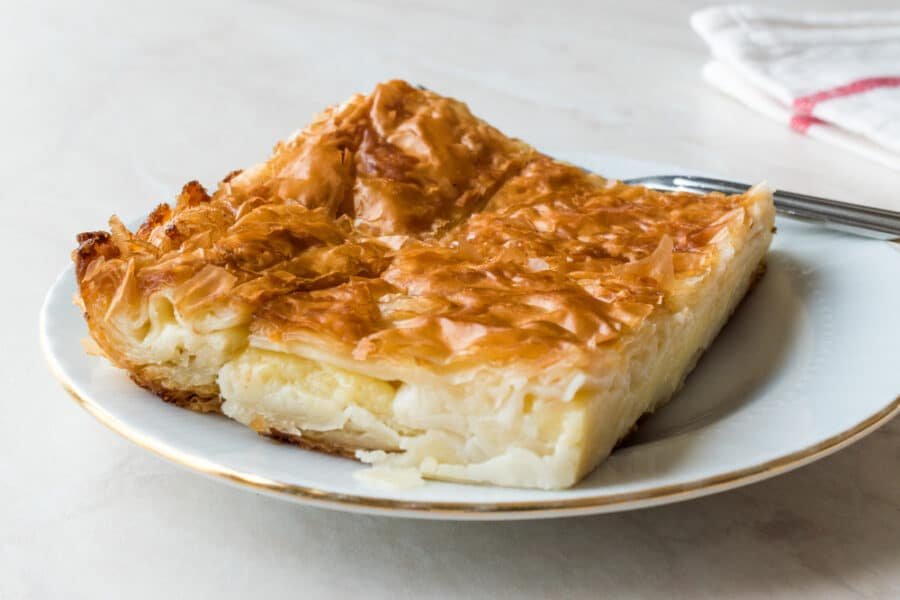
Borek is a type of breakfast pastry that is made with phyllo dough and can be filled with a variety of different cheeses. The most common fillings are feta cheese, kasseri cheese, and white cheese. Other common ingredients include eggs, parsley, dill, and black pepper. The pastries are typically baked in the oven until they are golden brown.
Turkish Borek is a delicious breakfast option for those who want something savory and cheesy. The flaky phyllo dough pairs perfectly with the creamy filling, making for a light and satisfying meal. Whether you enjoy them on their own or with a cup of coffee, Turkish Borek is sure to start your day off right!
10. Zeytin Ezmesi (Olive Spread)

There are loads of pastes and spreads on offer at breakfast in Turkey, but Zeytin ezmesi was our favorite. It’s a spreadable olive paste that is a staple of Turkish breakfast. It is typically made with green olives but can also be made as a black olive spread. Zeytin ezmesi is often served with a delicious range of fresh pieces of bread and can also be used as a dip for vegetables or crackers.
11. Pekmezi (Molassses – Kind Of Jam-Like)
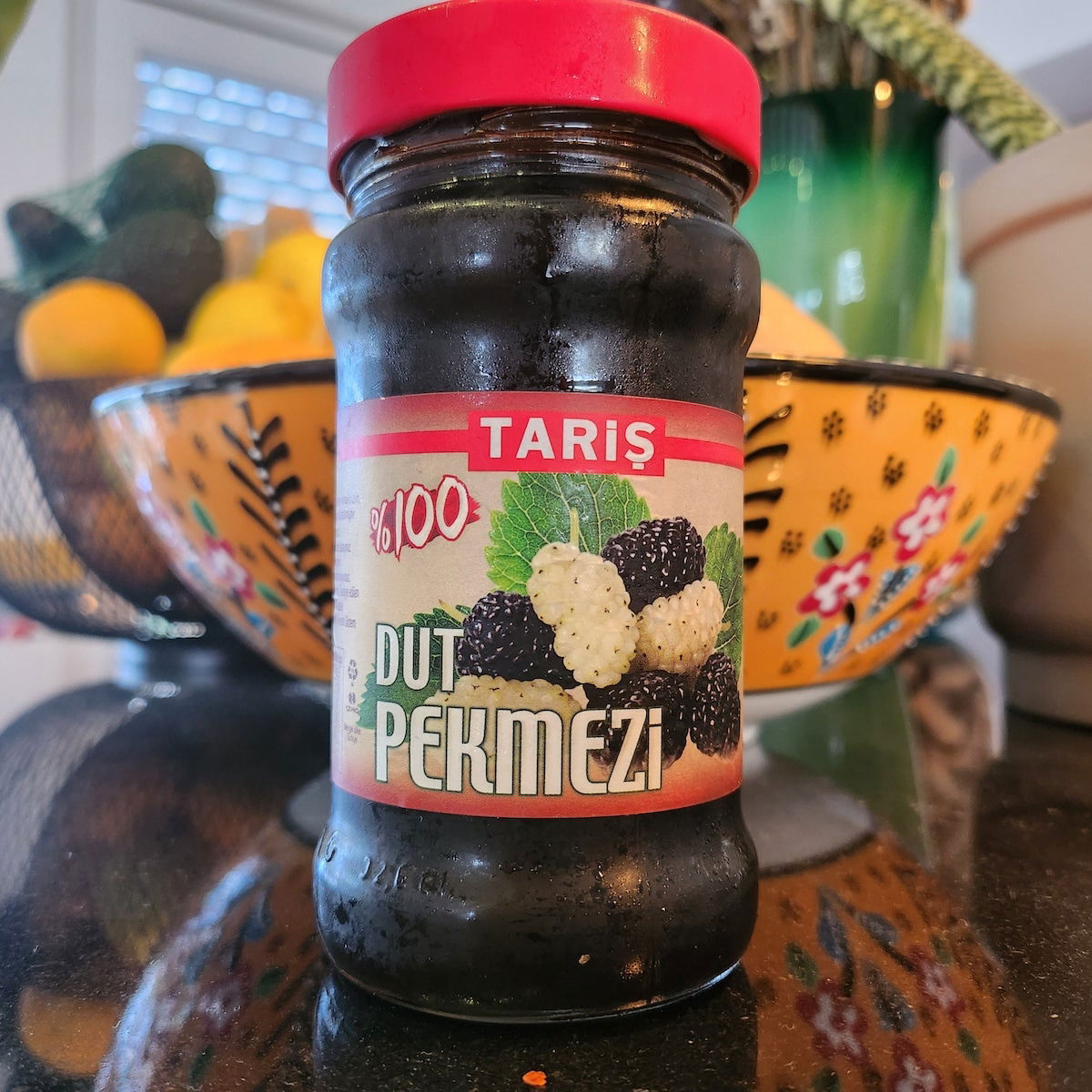
Turkish pekmez is a molasses-like syrup made from boiled grape juice, and it’s a popular breakfast condiment in Türkiye. Pekmez has a deep, unique flavor and is often used to sweeten coffee or tea. It’s also delicious on pancakes or waffles. Our favorite was the mulberry pekmezi, but also the grape molasses was also divine.
We loved it so much that we returned home from Turkey with three jars of it for us to savor.
12. Beyaz Peynir
Beyaz peynir is a type of white cheese that is commonly used in Turkish breakfast dishes. It has a mild and slightly salty flavor and is often used as a spread on fresh bread or as an ingredient in savory dishes such as menemen (a type of omelet).
13. Turkish Ayran Yogurt Drink

Ayran is a Turkish yogurt drink that is traditionally made with water, yogurt, and salt. It is a refreshing and healthy drink that is perfect with your eggs.
Note: Turkish Ayran is not traditionally served at breakfast, but we found it to be a great addition to our spread while traveling. It is commonly drunk on hot summer days and served up with kebabs or köfte at lunch – my kids drank this at almost every meal; it was that good.
More Traditional Turkish Breakfast Dishes
14. Pastirmali Yumurta (Eggs with Air-Dried Cured Beef, Mutton, or Buffalo)
This dish combines the rich flavor of air-dried cured beef, mutton, or buffalo with the simplicity of eggs. A hearty breakfast where the robust taste of the meat complements the creamy texture of eggs.
15. Kıymalı Yumurta (Fried Eggs with Ground Meat)
A fusion of fried eggs and ground meat, typically beef or lamb. Seasoned and cooked meat is topped with eggs for a protein-packed meal.
16. Çılbır (Poached Eggs with Yogurt)
A unique dish featuring poached eggs over creamy yogurt often spiced up with melted butter and paprika or sumac.
17. Omlet (Omelette with Various Ingredients)
The Turkish omelet is versatile, accommodating a range of ingredients for a fluffy and light staple breakfast.
18. Açma (A Soft, Bun-Like Pastry)
A soft, fluffy bun, often compared to a bagel but lighter. Açma can be plain or filled, perfect for on-the-go breakfasts.
19. Börek (A Flaky Dough Pastry with Various Fillings)
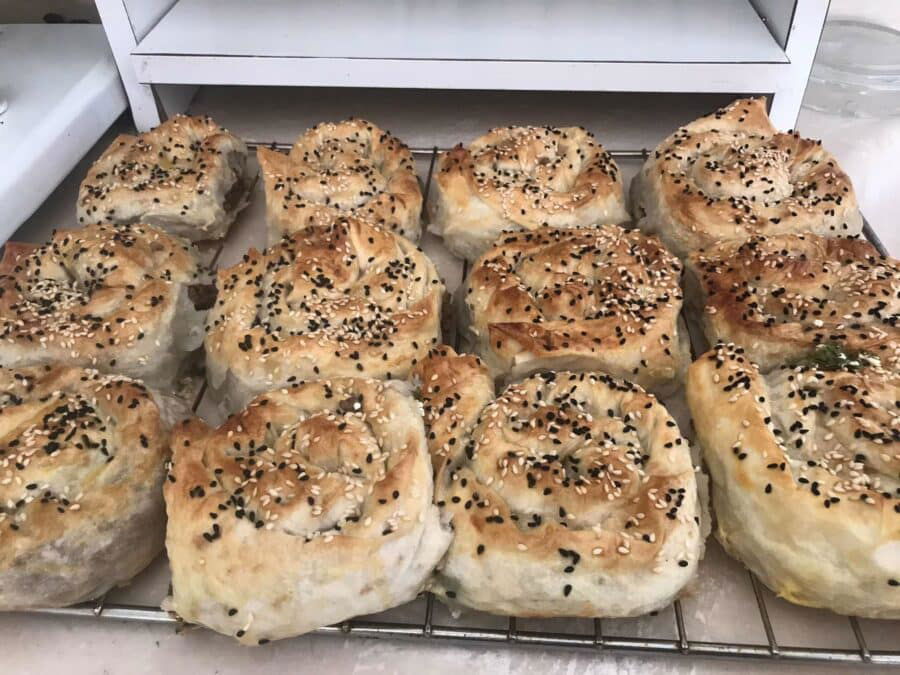
A versatile pastry made with flaky dough and filled with cheese, spinach, or ground meat.
20. Sigara Börek (Crunchy Rolls with Cheese Filling)
Slender, crispy rolls filled with cheese, resembling cigarettes in shape.
21. Açması Börek (Layered Pastry Similar to Lasagna)
A healthier, layered pastry with layers of dough filled with cheese, meat, or spinach.
22. Pide (Boat-Shaped Flatbread with Various Fillings)

Often called Turkish pizza, pide is a boat-shaped flatbread with a variety of toppings.
23. Bazlama (A Flat, Round Bread Cooked in a Pan)
A basic breakfast item that is a round bread cooked in a pan, resembling a thick tortilla, often served warm with cheese or butter.
24. Pişi (Turkish-Style Donuts)
Soft, deep-fried breads that are either sweet or plain, often paired with jams or honey.
25. Kuymak or Muhlama (A Mixture of Cheese, Butter, Water & Cornmeal)
A rich, cheesy dish made from a mixture of cheese, butter, water, and cornmeal, often scooped up with bread.
26. Izgara Hellim Peyniri (Grilled Halloumi Cheese)
Grilled halloumi cheese is known for its firm texture and ability to hold its shape, adding a savory touch to breakfast.
27. Bal Kaymak (Honey and Turkish Savory Whipped Cream)
A luxurious combination of honey and a creamy dairy product, often spread over bread for a decadent breakfast treat.
28. Acuka Or Muhammara (A Type of Paste with Spices & Lemon)

A spicy and tangy paste made with red peppers, walnuts, and a blend of spices, adding a kick to breakfast dishes.
29. Tahin Ezmesi (Sesame Paste)
A paste made from ground sesame seeds, nutty and creamy, commonly paired with pekmez for a sweet and savory spread.
30. Findik Ezmesi (Hazelnut Spreads)
A smooth, rich hazelnut paste, similar to nut butter, spreadable and sweet.
31. Turkish Tea & Coffee
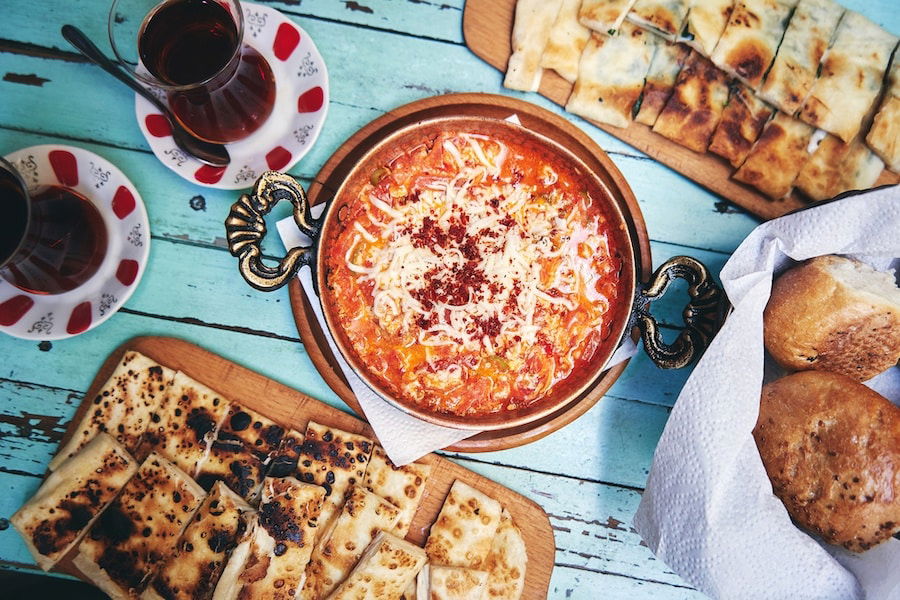
Turkish coffee and tea are two of the most popular breakfast drinks in Turkey. Turkish coffee is made by brewing finely ground coffee beans with water and sugar.
The resulting coffee is thick and strong, making it a perfect drink to start the day. On the other hand, Turkish tea is made by steeping black tea leaves in hot water. It is typically served with lemon and honey, making it a refreshing and healthy beverage.
How To Make Turkish Coffee
Turkish coffee is a type of coffee that is brewed using very fine grinds of coffee beans. The grinds are so fine they resemble powder. This type of coffee is usually served in small cups with the grounds still in the cup.
When making Turkish coffee, it’s important to use cold water. Bring the water to a boil and then remove it from the heat. Add two heaping tablespoons of ground coffee per cup of water. Stir well and return to heat. Bring the mixture just to a boil and then remove from heat again. Let the mixture sit for a minute so the grounds can settle to the bottom of the pot.
Pour the coffee into small cups, being careful not to include any of the grounds that have settled at the bottom of the pot. Enjoy your Turkish coffee!
How To Make Turkish Tea
Turkish tea is one of the most popular drinks in Turkey and has a long history dating back to the Ottoman Empire. Tea is typically brewed with black tea leaves and served with sugar, milk, or lemon. It is common to find Turkish tea stalls serving tea in traditional glass cups called “finjan.”
Brewing Turkish tea is an art form, and there are specific instructions on how to do it correctly. First, the teapot must be rinsed with boiling water to warm it up. Then, boiling water and two heaping spoonfuls of black tea leaves are added to the teapot. The pot is then covered and steeped for 3-5 minutes before being poured into small glasses.
Sugar and milk are added according to taste. Turkish tea is typically drunk throughout the day and often accompanied by conversation and snacks.
Move This Adventure To Your Inbox & Get An Instant Freebie

No spam. Unsubscribe at any time.
All Turkish Breakfast Are Not Created Equal – What You Should Know

When exploring Turkish breakfast options, you’ll encounter three distinct breakfast spread styles, each offering a unique culinary experience.
Kahvaltı Tabağı
First up is Kahvaltı tabağı, the quintessential choice for a light and quick breakfast. Picture a single plate neatly presenting a boiled or sunny-side-up egg, slices of cheese and ham, a choice of jam or paste, olives, and fresh vegetables. It’s a common sight in hotels, perfect for those who prefer a straightforward, no-fuss meal to start their day.
Açık Büfe Kahvaltı
For those who relish variety and abundance, Açık büfe kahvaltı is the way to go. This ‘open breakfast buffet’ is packed with local ingredients and is a total feast for the senses and the appetite. Available in many restaurants and especially popular in larger hotels, it invites guests to indulge in an array of dishes, selecting whatever catches their fancy. It’s a celebration of choice and abundance, perfect for leisurely mornings when you want to taste a bit of everything.
Serpme Kahvalti
Lastly, there’s Serpme kahvalti, the Turkish word that in English translates to ‘mixed breakfast.’ This is where the magic of Turkish breakfast truly unfolds and is a must for breakfast lovers. Designed for sharing, it features an array of small, colorful small plates, each bearing a different delicacy. The selection is standard for all, with the only choice being how you prefer your eggs. This breakfast is a communal affair, often enjoyed with friends or with Turkish families during a relaxed weekend morning. Prices for two can range from €8-20, depending on the breakfast place.
Regional Differences In Türkiye For Breakfast Options
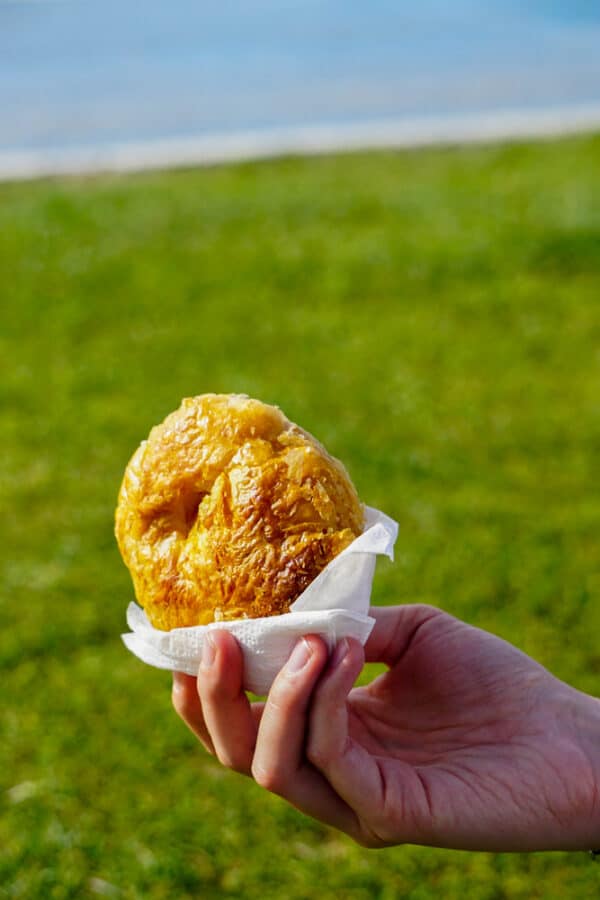
There are regional variations in what is served for breakfast. For example, cornbread is a popular option in the Black Sea region. In the Aegean region, types of seafood can be served for breakfast. And in the southeastern Anatolia region, köfte (meatballs) are a popular choice.
One cool regional breakfast food in Turkey we discovered was Boyoz. This pastry is of Sephardic Jewish origin, associated with Izmir, Turkey – and makes the perfect breakfast on the run while sightseeing.
Before we headed out for a day of sightseeing while in Turkey, we always made sure to have a big and delicious breakfast. We loved starting our day with a hearty meal that would give us the energy we needed to explore all the fantastic sights and sounds of Turkey.
What are the main types of Turkish breakfast?
There are three main types: Kahvaltı tabağı is a mini breakfast with ingredients on one plate, Açık büfe kahvaltı is an open buffet breakfast with multiple dishes, and Serpme kahvalti is a ‘mixed breakfast’ with a variety of small plates served based on the number of people.
What are typical dishes included in a Turkish breakfast?
A traditional Turkish breakfast, known as ‘kahvaltı’, typically includes bread, olives, cheese, eggs, tomatoes, cucumbers, honey, kaymak (clotted cream), and a variety of jams. Meats like pastirma (seasoned, air-dried cured beef) and sucuk (a spicy Turkish sausage) are also common. Turkish tea or coffee often accompanies the meal.
Is Turkish breakfast served all day?
In many cafes and restaurants in Türkiye, breakfast can be ordered throughout the day. This is particularly popular in tourist areas and larger cities.
What is ‘Menemen’, and how is it served?
Menemen is a traditional Turkish dish made with scrambled eggs, tomatoes, green peppers, and spices like red pepper flakes and black pepper. It’s often served hot in a skillet, with bread on the side for dipping.
Are there vegetarian options available in Turkish breakfasts?
Yes, there are many vegetarian options in a Turkish breakfast. Dishes like olives, cheese, tomatoes, cucumbers, various jams, honey, and kaymak are inherently vegetarian. Additionally, many eateries offer customized breakfast plates.
What is the significance of tea or coffee in a Turkish breakfast?
Tea is a central part of Turkish culture and is commonly served at breakfast. Turkish coffee is also a popular choice, known for its strong flavor and thick consistency. Both beverages are integral to the social aspect of the meal.
No matter what region you’re in, there’s always the perfect Turkish cuisine on any breakfast menu for your first meal to kick-start your day! Afiyet olsun.
- Best Restaurants In Bodrum
- Best Restaurants In Kadikoy
- Best Turkish Coffee In Istanbul
- Weird Turkish Foods To Try
- Traditional Soups To Eat In Turkey
- Vegan Turkish Dishes
- Best Turkish Desserts To Try
- Turkish Drinks To Try In Turkey
- Turkish Breakfast – What’s Served
- Street Foods In Istanbul Beyond The Kebab
- Where To Get Turkish Breakfast In Antalya
- Easy Turkish Lahmacun Recipe
- How To Make Turkish Spinach & Feta Borek
- Recipe For Turkish Menemen
- Make Authentic Adana Kebabs At Home
- Delicious Turkish Pide Recipe


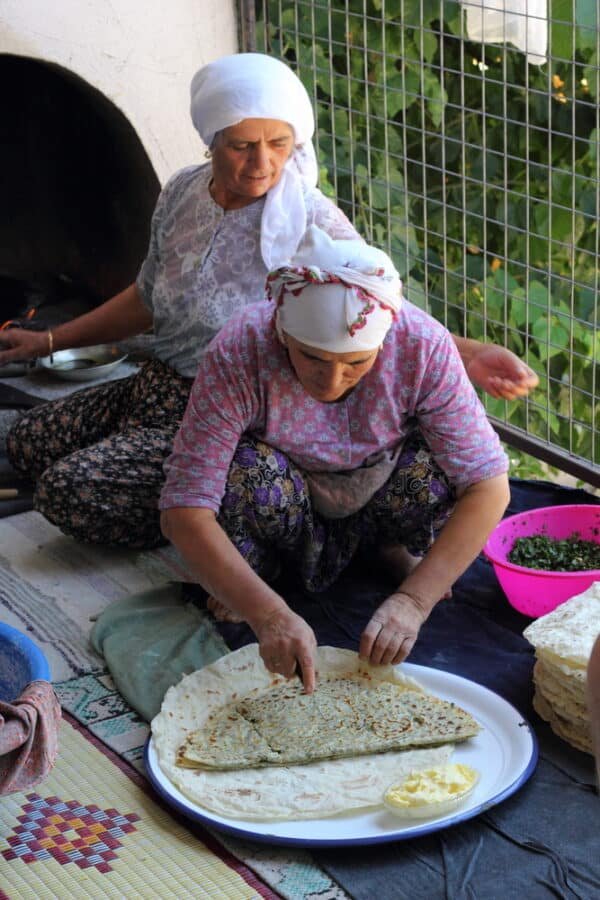
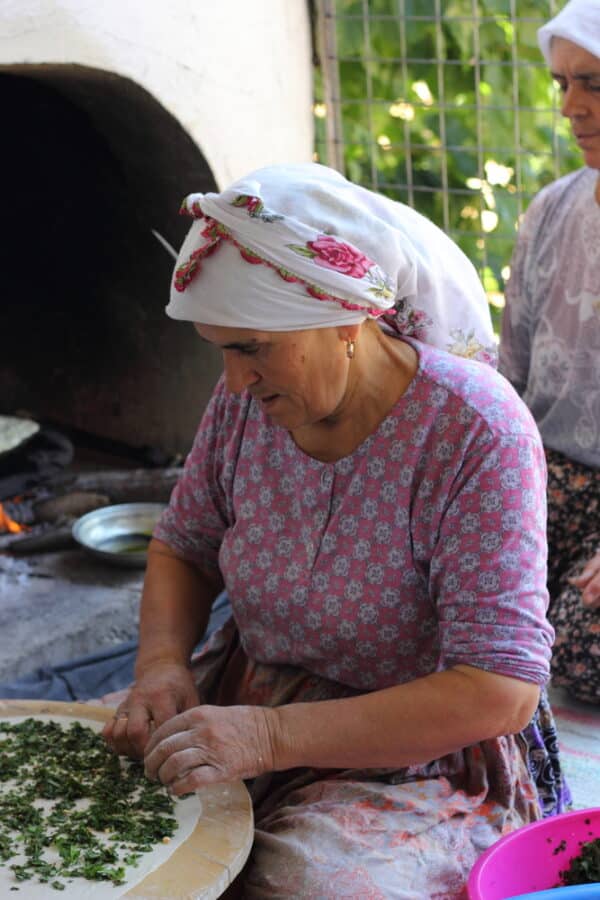
Fantastic breakfast choices in Turkey! A delicious start to my day!